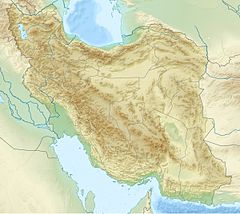The Mangrove forests of Qeshm or Hara forests of Qeshm, are the mangrove forests on the southern coast of Iran, particularly on and near the island of Qeshm in the Persian Gulf.[2] Dominated by the species Avicennia marina, known locally as the "hara" or "harra" tree, the forests represent an ecological resource. The "Hara Protected Area" on Quesm and the nearby mainland is a biosphere reserve where commercial use is restricted to fishing (mainly shrimp), tourist boat trips, and limited mangrove cutting for animal feed.



Hara tree characteristics
editThe hara tree, Avicennia marina, grows to heights of three to eight meters and has bright green leaves and twigs. The long, narrow, oval leaves of the tree have nutritious value for livestock roughly equivalent to barley and alfalfa.
Forest extent and significance
editThe hara forest on Qeshm and the opposite mainland covers an area of approximately 20 km by 20 km, with many tidal channels. In 1972 the Hara Protected Area was established to preserve suitable conditions for the growth and maintenance of the forests. The area is a habitat for migratory birds in the cold season, and for reptiles, fish, and varieties of arthropoda and bivalves.
History
editCenturies ago, Asian elephants (the Indian or Syrian elephant) once lived in the region of Qeshm and other regions of southern Iran.[3]
See also
editReferences
editExternal links
edit- Thomas Hopner; Hossein Ebrahimipour; M. Kazem Marashi (2000). "Intertidal Areas of the Persian Gulf" (PDF). Wadden Sea Newsletter. Archived from the original (PDF) on 2007-09-28. Retrieved 2007-03-06.
- Events Magazine article on Qeshm Island
- Fotopages.com page on Hara Forest
- Discussion of Hara Forest on Minâb website
